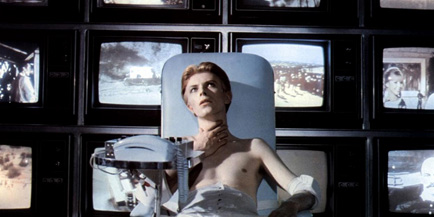|
|
Viking Night: The Man Who Fell to EarthBy Bruce HallOctober 13, 2015
At various times, Newton experiences visions of his family back on his home world. He also seems to have an ability to see into the past, or to exist in multiple time frames. Occasionally, he appears to have some sort of mind reading ability. But none of these experiences ever amount to anything and it’s never clear what - if anything - it all means. At one point, World Enterprises attracts the attention of what seems to be the government, who try to intimidate Farnsworth with threats so mysteriously cryptic it’s almost hard to take them seriously, let alone fully understand what the problem is. The story digresses at a couple of points to focus on Farnsworth’s personal life, but it doesn’t seem to have any relevance to the overall plot. And we spend a little too much time with Peters (Bernie Casey), a government agent who lives like a mafia Don and openly wonders whether or not his actions are morally justified. I do too, because I have no idea who he is, what he’s doing, or why we have to spend 10 minutes watching him making out with his hot wife and putting his kids to bed right in the middle of the film. I could go on for another thousand words about how frustrating this movie is, but I think you get the idea. But what’s more important is that while yes I was perplexed, yes I was confused and yes, at times I was praying for it to end, I was never at any point patently uninterested. That sounds like faint praise because it is. But The Man Who Fell to Earth is such an ambitious and thoroughly avant-garde undertaking that it’s hard for me to fault it for swinging so hard at the ball. They don’t make movies like this anymore, and while in some ways that’s a good thing, it’s also the reason most science fiction movies these days feel like something you’ve already seen a hundred times before. David Bowie was an ideal choice for the lead here, because if you could turn the man himself into a two-hour film, this is about what you’d get. It’s maddening, moving, haunting, laborious, and fascinating - and whether you love it or hate it or just end up scratching your head like I did, you’ll still be thinking about it a week later. I guess what I’m saying is, David Bowie is probably an alien.
|

|
|
|

|
Saturday, April 20, 2024
© 2024 Box Office Prophets, a division of One Of Us, Inc.


